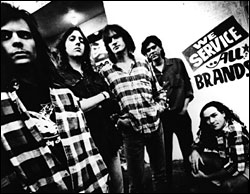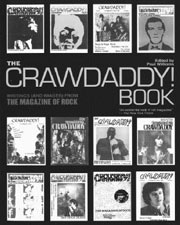The Other Night on the radio, a Gin Blossoms song drifted in from the past. A sad songthe kind that gives you hope when maybe you’re so lonely that hope isn’t much of an option. It made me think of times past when I’ve felt that way and of how a close friend recently confided that she was going through a breakup that threatened to leave her emotionally crippled. What do you do when you hear one of these songs? Smile amid a warm, nostalgic glow? Weep from a particular memory? Reach for a bottle?
I hadn’t listened to the Gin Blossoms in ages. They’d broken up in 1997 after an impressive mid-’90s radio/retail reign, and I really didn’t give much thought to their reunion last year. But after hearing them on the radio, I found myself pulling their breakthrough album, New Miserable Experience, down from the shelf. It took my breath awayand I don’t offer that lightly. In my worldone of too many records and not enough quality listening timefew are the pop albums that retain their luster 10 years on. Fewer still are those that can blow past mere nostalgia and summon their original powers of transcendence.
See, back in the summer of ’92, when New Miserable Experience was released by A&M, I happened to be working in an Arizona record store. The Blossoms, from Tempe, were local heroes, so, needless to say, I heard the album a lotlike, each day before we opened; right when the first customer walked in; during the lunchtime rush; shortly after the nighttime crew arrived; etc. You get the picture. Familiarity might have bred contemptif I could have gotten the tunes out of my head. From the blazing power-pop of “Hey Jealousy” and the trembly, Byrds-ian “Until I Fall Away” to the twangy Merseybeat of “Allison Road” and the R.E.M.-meets-Velvets jangler “Found Out About You,” it seemed like these were tunes I’d known all my life. They felt intimate and familiar yet, at the same time, were raw and exhilarating in their immediacy.
“Found Out About You,” in particular, is one of the most perfectand saddestsongs ever. It is ushered in on the simplest of jangly motifs (pure Pete Buck, if anyone cares to notice), then lays down a warm, humming bed of electric and acoustic guitars which progressively grows in volume, Tom Petty rave-up style. Against that melodic backdrop, tremulous-throated vocalist Robin Wilson sketches out a tale (“Is there a line that I could write/Sad enough to make you cry/All the lines you wrote to me were lies. . . . Did you love me only in my head?”) of such believable, aching poignancy that it’s hard not to imagine the tune’s songwriter, gifted but troubled guitarist Doug Hopkins, snatched one of your miserable experiences for his own.
It was all his, however. Brian Smith, a former Arizonan and the current music editor of the Detroit Metro Times, recalls being present when his friend Hopkins unveiled “Found Out About You” for the first time: “He strummed the tune carefully on an unplugged electric guitar with lyrics scrawled on the back of a crumpled show flier. A pawn shop had his amp. Hopkins himself had nothing. Electricity came via an extension cord that ran in from the apartment complex’s laundry room. He sat on a filthy mattress. The floor was all beer bottles, spilling ashtrays, and dirty dishes. Hopkins’ girlfriend had just left him, had recently bashed in the side of his head. He was broke, unemployed, and heartbroken. He had tried suicide. ‘Found Out About You’ is all that. It’s all about the girl, the loss, the drinking. So honest. So open. It’s funnyall Hopkins ever wanted was a hit song that was potent enough to be tinged with a sadness like Badfinger’s ‘Day After Day.’ He succeeded.”
Bitter Irony being what it is, in the throes of depression, Hopkinswhose alcoholism and erratic behavior forced his fellow Gin Blossoms to kick him out of the band he’d foundedblew his brains out in late ’93. His greatest song was still riding high in the Billboard charts, and by then the Blossoms were well on their way to enjoying a massive wave of popularity. Whether or not the current incarnation of the Blossoms can reclaim any of that success is irrelevant. They already earned their brass ring, and last year A&M/Universal paid the band the ultimate compliment by releasing an expanded two-CD version of New Miserable Experience, placing them alongside such artists as Bob Marley, Marvin Gaye, the Who, and the Velvet Underground, who were given similar “deluxe edition” reissue treatments of key albums.
Besides, the actual music and words are what go on to become much bigger than the artists who create them. So many of our most memorable songs are about heartache and tragedy, painted, like “Found Out About You,” in deep blue-hued tones: “I Heard It Through the Grapevine,” “You’ve Got to Hide Your Love Away,” “You Keep Me Hanging On,” “Love Hurts.” We embrace these tunes. They exist to help us work through our lives, give us shoulders to lean on, put into words the feelings we’re too terrified to confront with such naked self-scrutiny.
Unlike the oftentimes wavering loyalties of friends, lovers, and family members, a sad song will never let you down.








